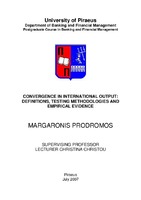Convergence in international output: definitions, testing methodologies and empirical evidence

Master Thesis
Συγγραφέας
Μαργαρώνης, Πρόδρομος
Ημερομηνία
2007-11-20Προβολή/
Θεματική επικεφαλίδα
International trade -- Econometric models ; Gross national product -- Econometric models ; Economic development -- Econometric modelsΠερίληψη
The aim of the present research is to investigate whether there is
convergence in per capita GDP among different countries in a global
context. Special emphasis is laid on the 15 state members of E.U., after
their effort for convergence, signing the Maastricht convention in 1992
and till 2004. We present some stylized facts and the prevalent
definitions of convergence. Further, we present the various testing
methodologies of convergence and we critically evaluate their empirical
findings. We, then, propose a pair-wise approach to testing for output
and growth convergence and present its conclusions.
The investigation of the degree of convergence in real per capita
output in selected group of countries was prompted by two reasons.
First, evidence of no economic convergence within a region can bring
about social and political instability as economic performance varies
significantly across countries. Second, evidence of no convergence in
unions such as European Union would imply that association
agreements and other institutional linkages with respect to the particular
union do not necessarily lead to economic convergence. Ultimately, if
there is no automatic mechanism that ensures the convergence of
economies over time, it is not only justified but also probably ethically
necessary and “politically correct” to implement public policies aimed at
helping the poorer (regions or countries) to catch-up as fast as possible
with the richer. Knowing whether it is justified to dedicate public funds to
these policies is therefore an important matter both for national and
supra-national governments.


